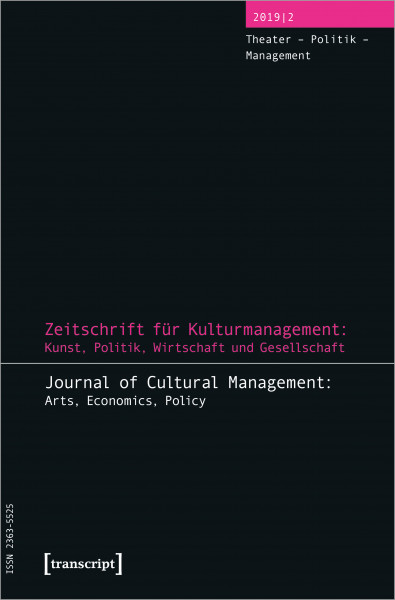Research Article
Power as Concept of structure and organization in theatre
Abstract
The article is based on the study Art and Power in the Theater (2018), which was conducted among nearly 2,000 participants – primarily artistic staff and performers. The article analyzes the topics of power and abuse in the theater organizations. Key findings include that over 50 % of participants have experienced at least one abuse of power in their careers. In addition, the social demands of employees in many theaters are simply ignored, while the interests of the directors are placed at the center. The theaters are structurally organized to promote the abuse of power. Moreover, mission statements and codes of conduct are lacking to regulate the use of power. It is not expected, that their directors are trained in human resources, management or social skills. Any senior theater artist, who has the necessary artistic prerequisites and the right networks, is considered to be capable of leadership in theaters. Power becomes a management tool, consolidating hierarchical structures and the director-centered governance model. It thus becomes a structural and organizational concept in the German theater landscape.
Keywords
2019 (2)
Theatre – Politics – Management

Related Articles
Theater im Wandel
Vom Krisenmanagement zur ZukunftsfähigkeitYearbook for Culture Management 2011
Research Article
Intangible Cultural Heritage, Sustainable Development, and the Integrating Role of Music
Journal of Cultural Management and Cultural Policy
Research Article
Journal of Cultural Management 2018 (2)
Research Article
Kulturelle Partizipation im Langzeitvergleich
Eine empirische Analyse am Beispiel der Stadt KölnYearbook for Culture Management 2012
Research Article
Postaffirmatives Kulturmanagement
Überlegungen zur Neukartierung kulturmanagerialer BegriffspolitikYearbook for Culture Management
Essay
© 2026, Journal of Cultural Management and Cultural Policy
Keywords
- Aesthetics
- Higher Education
- Cultural Diplomacy and Foreign Cultural Policy
- Occupation
- Career and Professional Role
- Audience Development
- Audience Studies and Visitor Studies
- Visitor Motivations
- Business
- Covid Pandemic
- Democracy
- Digitalization
- Diversity
- Third Sector
- Empirical Aesthetics
- Development
- Ethics
- Evaluation
- Field Theory
- Festival
- Film
- Federalism
- Community Arts
- Societal Change
- Ideology
- Staging
- Career
- Communication
- Concert
- Creative Industries
- Creativity
- Crisis
- Culture
- arts organizations, cultural organizations
- Cultural Participation
- Cultural Change
- Fincancing The Arts
- Cultural Promotion Law
- Cultural History
- Cultural Management
- Cultural Economy
- Cultural Organizations
- Art Education
- Cultural Policy
- Cultural Production
- Cultural Sociology
- Art Education
- Cultural Understanding
- Arts Administration
- Cultural Industry
- Cultural Sciences
- Art
- Art Field
- Arts Research
- Artists
- Artistic Research
- Artistic Reputation
- Arts Management
- Arts Organizations
- Art education
- Arts Marketing
- Arts Administration
- Curating
- Leadership
- Literature
- Advocacy
- Management
- Marketing
- Market
- Media
- Methods Development
- Mexico
- Monumentalizing
- Museum
- Music
- Non-Visitor Studies
- Opera
- Orchestra
- Organization
- Political Expression
- Post-truth Politics
- Professional Role
- Audience
- Audience Development
- Law
- Government
- Role
- Socially Engaged Art
- Social Cohesion
- Social Change
- Social Cohesion
- Non-visitor Socio-demographics
- Socioculture
- State
- Symbolic capital
- Dance
- Participatory Justice
- Theatre
- Theatre Governance
- Theory Development
- Tourism
- Transformation
- Survey
- Entrepreneurship
- Urbanism
- Civil Society


